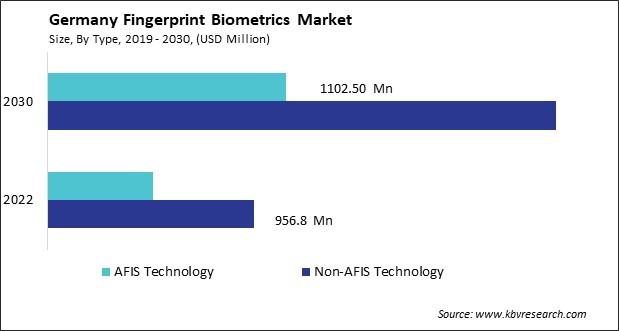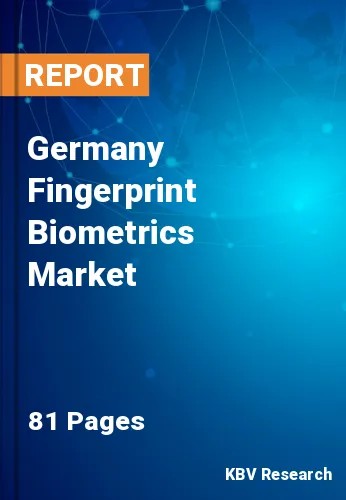The Germany Fingerprint Biometrics Market size is expected to reach $3.5 billion by 2030, rising at a market growth of 11.6% CAGR during the forecast period.
The fingerprint biometrics market in Germany has witnessed significant growth over the past decade, driven by technological advancements, increasing security concerns, and the widespread adoption of biometric systems across various industries. In recent years, Germany has been at the forefront of adopting biometric technologies to enhance security measures and streamline processes. With an emphasis on protecting individual privacy rights, German companies have focused on developing secure and compliant biometric solutions that adhere to the highest data protection standards.

Furthermore, the government sector has also been a major contributor to the growth of the fingerprint biometrics market in Germany. Government agencies in Germany have deployed biometric systems for various applications, including border control, identity verification, and access control to secure facilities and sensitive information. The adoption of fingerprint biometrics has helped improve security measures, prevent identity theft, and streamline administrative processes.
The healthcare industry is another significant end-user segment driving the demand for fingerprint biometrics in Germany. Healthcare providers in Germany have implemented biometric systems to ensure accurate patient identification, secure access to electronic medical records, and prevent unauthorized access to sensitive patient information.
According to the International Trade Administration, Germany's healthcare sector generates an economic footprint of EUR 775 billion, or roughly 12 % of Germany's GDP. In 2022, the gross value added to the healthcare industry was EUR 439.6 billion. This corresponds to 12.7 % of the gross value added of the overall German economy. As Germany continues to prioritize technological innovation and economic diversification, the fingerprint biometrics market is expected to witness significant opportunities for expansion and integration into the nation's broader economic framework.
The COVID-19 pandemic has significantly impacted the fingerprint biometrics market in Germany, as it has accelerated the adoption of contactless biometric solutions. Concerns about the transmission of the virus through surface contact have led to increased demand for touchless authentication technologies such as facial recognition and iris recognition. While fingerprint biometrics remain a reliable form of authentication, the pandemic has highlighted the importance of contactless solutions in ensuring public health and safety.
In recent years, Germany has witnessed a concerning rise in cyberattacks targeting the fingerprint biometrics market, reflecting broader global trends in cybersecurity threats. One of the primary factors driving the increased frequency of cyberattacks in the fingerprint biometrics market in Germany is the growing adoption of biometric technology across various sectors. As more organizations and individuals embrace fingerprint-based authentication systems for convenience and security benefits, they become lucrative targets for cybercriminals seeking to exploit vulnerabilities in these systems.
Moreover, the interconnected nature of digital infrastructure and the proliferation of internet-connected devices have expanded the attack surface for cyber threats. Hackers leverage sophisticated techniques such as malware, phishing, and ransomware to compromise fingerprint biometric systems, potentially gaining unauthorized access to sensitive data or impersonating legitimate users. Furthermore, the interconnectedness of modern technology exacerbates the risks. Many fingerprint biometric systems are linked to networks and databases, allowing attackers to infiltrate and compromise entire systems.
Addressing the escalating frequency of cyberattacks in the fingerprint biometrics market in Germany demands a multifaceted approach. This includes continuous investment in cybersecurity infrastructure, rigorous testing of biometric systems for vulnerabilities, ongoing employee training and awareness programs, and collaboration between public and private sectors to share threat intelligence and best practices.
Furthermore, compliance with regulations such as the General Data Protection Regulation (GDPR) adds a layer of complexity for organizations operating in Germany. Ensuring compliance while maintaining robust security measures requires significant resources and expertise. Hence, safeguarding the fingerprint biometrics market in Germany against cyber threats necessitates a comprehensive strategy encompassing technological innovation.
The adoption of biometric payment systems, particularly those utilizing fingerprint biometrics, has steadily grown in Germany. One of the key drivers behind the adoption of fingerprint biometric payment systems in Germany is the heightened emphasis on security. With traditional payment methods such as credit cards and PINs susceptible to fraud and identity theft, consumers increasingly turn to biometric solutions for enhanced security.
Moreover, the convenience offered by fingerprint biometric payment systems plays a significant role in their growing popularity. With just a simple touch, German consumers quickly and securely authorize transactions without carrying physical cards or remembering complex passwords. This streamlined process saves time and enhances the overall shopping experience for German consumers.
Another factor driving the adoption of biometric payment systems in Germany is the widespread availability of fingerprint recognition technology. Advances in biometric sensor technology have made fingerprint scanners more affordable and accessible, leading to their integration into various payment devices such as smartphones, POS terminals, and biometric cards. Thus, the convergence of heightened security, convenience, and technological accessibility fuels the growing adoption of fingerprint biometric payment systems in Germany.

Germany, known for its engineering prowess and commitment to privacy and security, boasts a robust fingerprint biometrics market with several notable companies leading innovation and adoption. One prominent German fingerprint biometrics market company is Dermalog Identification Systems GmbH, headquartered in Hamburg. Dermalog is a leading provider of biometric identification solutions, offering fingerprint recognition systems for applications such as border control, ePassport issuance, and voter registration. The company's proprietary fingerprint-matching algorithms and high-performance biometric scanners have earned recognition for accuracy, reliability, and efficiency in identity verification.
Another significant player is Secunet Security Networks AG, based in Essen, Germany. The company's specializes in cybersecurity and identity management solutions, including fingerprint biometrics for access control and authentication. Secunet's fingerprint recognition technology is used in government agencies, critical infrastructure facilities, and corporate environments to ensure secure and convenient access to sensitive information and resources.
German multinational corporation Siemens AG also offers fingerprint biometrics solutions as part of its broader portfolio of security and identification products. Siemens' biometric systems are deployed in various sectors, including transportation, healthcare, and finance, where reliable and accurate identity verification is essential for regulatory compliance and risk mitigation.
BioID AG, headquartered in Nuremberg, Germany, is a leading provider of biometric authentication solutions, including facial recognition and fingerprint biometrics. BioID's cloud-based biometric authentication platform enables seamless integration of fingerprint recognition capabilities into web and mobile applications, offering users a convenient and secure authentication experience while ensuring compliance with data protection regulations such as GDPR.
In addition to these established players, Germany's fingerprint biometrics market is home to a vibrant ecosystem of startups and technology companies driving innovation in the field. These startups focus on niche applications such as mobile biometrics, biometric authentication for IoT devices, and biometric payment solutions, leveraging cutting-edge technologies to address evolving industry demands. Hence, the fingerprint biometrics market in Germany is characterized by a diverse range of companies offering innovative solutions for various applications.
By Type
By Offering
By End User
Our team of dedicated experts can provide you with attractive expansion opportunities for your business.

